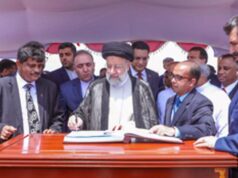Gaby Cara speaks to her nonna in fluent Italian, but only because she spent a year in a Tuscany when she was nine.
“We were in this tiny little village, and because I was so young, I just picked up Italian really quickly,” Gaby says.
For her dad Bruno, a second-generation Italian-Australian, this was a dream come true.
“I always wanted the kids to experience the culture, and to learn the language at a level where they could communicate freely,” he says.

Gaby and her sister Alexia, who was five at the time, attended the local school in picturesque Panzano.
Alexia soaked up the new language “like a sponge”.
“She had a real Tuscan inflection. It was actually beautiful,” Bruno says.
“Roots migration”, or going to the homeland for an immersive cultural and linguistic experience, is how the Cara family managed to buck a rather alarming trend.
Losing your language
Italians are losing their language at a faster rate than any other ethnic group in Australia.
In the last 15 years or so there’s been a drop of around 80,000 people speaking Italian at home.
According to Census data, there were almost 354,000 people who spoke Italian at home in 2001. By 2016, that had fallen to around 272,000.
The Greeks share a similar migration trajectory to the Italians, but “there are some factors that have helped the Greeks maintain their language more,” says Antonia Rubino, senior lecturer in Italian Studies at the University of Sydney.
“One is the lack of this distinction between dialect and standard Italian.”
Many post-war Italian migrants spoke dialect as their first language, and often did not pass on Italian to the second generation, Dr Rubino explains.
“The Greeks also had the church,” she says.

The number of people who spoke Italian at home plunged from about 353,200 in 2001 to 271,600 in 2016.
The Greek Orthodox church is central to the family and has played a major role in the transmission of culture and language, whereas “Italians very often attended the local Catholic church which was mainly in English,” she says.
But the Greeks are not far behind the Italians when it comes to language loss.
That’s because it takes only three generations for many migrant families to lose the languages they come with.
“Australia is in many ways a graveyard of languages,” says Ingrid Piller, professor of applied linguistics at Macquarie University.
This term was coined by American linguist Joshua Fishman to apply to the US, but Australia also fits the bill.
Like the US, we’re an English dominant country where language diversity is not valued, according to Dr Piller.
The ‘monolingual mindset’?
This attitude is reflected in our education system.

Is Australia’s education system having an impact on multilingualism?
“Australia is one of the most multilingual countries in the world,” says Ken Cruickshank of the University of Sydney.
Yet, language education is not seen as a high priority and “languages are not part of the core curriculum in any state apart from Victoria in the primary schools,” he says.
In fact, he says, “we come lowest of all OECD countries in the provision and uptake of languages”.
The result is that a bilingual child has a five in six chance of losing their heritage language by the time they finish high school, according to Dr Cruickshank.
Or put simply, multilingual kids go to school to become monolingual, in the majority of cases in Australia.
This monolingual mindset is totally out of sync with our multilingual reality — around 300 languages are spoken in Australia on any given day.
There are two ways people can lose the languages they speak.
The first is through linguistic colonisation, which is what’s happened to many Indigenous and minority languages around the world.
The second is linguistic assimilation.
That’s when immigrants lose their languages as they gradually shift towards the dominant language, English — itself a migrant language.
Embracing language
But many, like the Cara family, are resisting what feels like an inevitable process of assimilation.
Nii Laryea Tetteh is 25, and is working hard to improve his use of the language he spoke as a child, called Ga, which is from his parents’ home country Ghana.

Nii Laryea Tetteh is trying to reclaim Ga, a language from Ghana he spoke as a child.
Growing up black in Australia, Nii was subjected to comments such as, “you look like Nutella,” or “you’re black because you got spray painted”.
“You just want to fit in, so you do things like straighten your hair, the typical Aussie things like drinking, going to the pub,” Nii says.
He also stopped speaking Ga.
But working on construction sites as a carpenter, he noticed Arabic being spoken around him, and he began to ask himself, “why am I disadvantaging myself by hiding my language?”
For Nii, speaking Ga is about being true to himself.
“No matter what I did, there’d always be someone or one person that would do something to remind me that I wasn’t from here, like even your close friends,” he says.
“I’m trying so hard to be something I’m not, it’s never going to work. Why don’t I just embrace what I am and stop pretending to be something I’m not?”
Nii now speaks Ga with his mum as much as possible, and is excited that he recently managed to have a phone conversation solely in Ga for the first time with his grandmother in Ghana.
Speaking to grandma in language might seem like a trivial event, but these transnational connections, together with opportunities to use Ga at home, constitute what linguists call “language ecology”, a supportive language environment that will make all the difference to Nii’s efforts to reclaim the language of his childhood.
Language ecology is exactly what Billy Jangala Williams has been largely denied.

Billy Jangala Williams has started lessons in Gamilaraay.
Billy always spoke a smattering of Gamilaraay words, but growing up Aboriginal in small town Collarenebri in north west NSW, “language was in some ways the most difficult thing to access”.
“My mob were told you can’t talk it, don’t you dare speak that, even don’t say you’re Aboriginal, even that far.”
Now 45, he’s started formal lessons in Gamilaraay, and feels the gravity and enormity of the task.
For Billy, speaking his language is about identity.
“There’s also a sense of connection, and maybe a healing that happens as well,” he explains.
Holding onto his language involves much higher stakes for Billy compared to Gaby and Alexia, or Nii.
Globally, there are at least 60 million people who speak Italian, and around 1 million speak Ga.
But according to the 2016 Census, there are only 105 speakers of Gamilaraay.
And that raises an important question for all of us living in multicultural Australia.
If language is key to people’s cultural identity, doesn’t it make sense that we value our rich multilingualism?
Gaby appreciates how important knowing Italian is.
Her language not only connects her to her nonna, but also gives her an understanding of different cultures.
“When we were younger, we didn’t think anything of going to Italy,” she says.
She’s now 30, and understands that living in Italy as a kid was also about experiencing a different culture, which is why she’s determined to pass Italian on to the next generation.
That would mean that four generations of Caras speak Italian — a small yet significant contribution to countering the image of Australia as a “graveyard of languages.”




